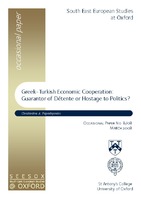| dc.contributor.author | Papadopoulos, Constantine |
| dc.date.accessioned | 2008-09-22T10:39:14Z |
| dc.date.available | 2008-09-22T10:39:14Z |
| dc.date.issued | 2008-03 |
| dc.identifier.uri | https://ketlib.lib.unipi.gr/xmlui/handle/ket/462 |
| dc.description | Occasional Paper No. 8/08 |
| dc.description.abstract | The post-1999 expansion in Greek-Turkish economic exchanges has led to hopes in
some quarters of a ‘decoupling’ of relations from the constrictive bonds imposed by
traditional bilateral politics. The ultimate goal would be that, through their own
‘normalising’ effects, intensifying economic relations in time render irrelevant or
obsolete many of the issues that for decades have divided the two countries.
This paper argues (i) that the prospects for trade, tourism, energy cooperation and
FDI, though positive and therefore supportive of a more benign climate, are unlikely
by themselves to overturn long-held foreign-policy priorities in either country, and
(ii) that the economic dimension as a means of conflict resolution will prove more
effective if allowed to develop in parallel with Turkey’s EU accession process. |
| dc.language.iso | en |
| dc.publisher | SEESOX - South East European Studies, Oxford. |
| dc.subject | Greece - Turkey |
| dc.subject | Economic Cooperation |
| dc.title | Greek-Turkish Economic Cooperation:Guarantor of Détente or Hostage to Politics? |
| dc.type | Report |
| dc.corporate.name | European Commission / Directorate General for Enlargement |
| dc.subject.countries | United Kingdom |

